Itch! You know the feeling—that tickly, tingly, crawly sensation that you just have to scratch. And it’s always in a place just…out…of…reach.
But why do we get itchy? Lots of reasons: mosquitoes, poison ivy, blackflies, bristly caterpillars, cactus, lice. Why do these things affect us so drastically, and how can we stop the itch? And can itching ever be a good thing?
ITCH is a nonfiction book that delves into the science behind our most irritating encounters with nature. Readers will discover:
–spiders that throw itchy hairs at their enemies,
–plants that sting, bite, and scratch,
–bugs that glue eggs to your hair and saw their way through your skin.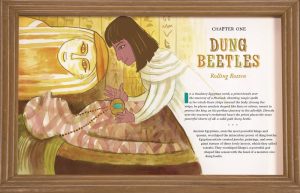
The book explains the biology of plants and animals which use irritation as a weapon of defense. Divided into short, fun chapters, the book will help young readers learn about the science of their own bodies and the amazing diversity of other organisms that also get itchy.
The text includes ways that young readers can safely avoid irritating plants and animals when exploring the outdoors. Each chapter contains helpful suggestions for easy, nontoxic ways for kids to soothe an annoying itch. (Try the inside of a banana peel on mosquito bites!)
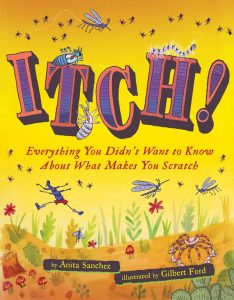 A Junior Library Guild Selection
A Junior Library Guild Selection
Finalist for the AAAS/Subaru SB&F Prize for Excellence in Science Books
Chicago Public Library’s Best Science Books of The Year
Bank Street Center Best Children’s Books of the Year
Reviews
“A fun, intriguing, and accessible mix of anatomy and history, with a healthy dose of gross.”–Kirkus, STARRED review
“There’s much here to attract readers in search of the gross or unsettling.”-School Library Journal
“Factual and surprisingly fun, here’s a very readable book about a common experience.”–Booklist, STARRED review
Why a Book on ITCH?
I got interested in the topic of ITCH when I discovered my grandfather’s journal, hidden in a long-forgotten box in the attic. He was a solider in World War One, and it was amazing to read his words, scribbled in pencil each day of that terrible war. 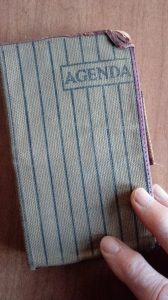 I was surprised to find that, even as he was dodging sniper bullets, one of the main problems on his mind was being itchy.
I was surprised to find that, even as he was dodging sniper bullets, one of the main problems on his mind was being itchy.
Lice were a constant torment, and he called the hated bugs “cooties.” He was thrilled when he finally got to do what he’d been dreaming of for many months: take a bath. He wrote “I AM COOTIE-LESS!!!” in giant letters across the page.
I started to wonder how such tiny critters could produce such a big effect on people—and why.
Why ITCH?
It’s always a little awkward. When people ask what my new book is all about, I sort of wish that I could say whales. Or dolphins or puppies. Something cool, something cute. Something that doesn’t have piercing, sucking mouthparts and a whole lot of legs.
Alas, I have to clear my throat, shuffle my feet and reply, well, it’s about …um…things that make you itch.
Itch?
Well, yes, that’s the title, actually. It’s a book about things that make you itch. Fleas and mosquitoes and poison ivy and (I’m sorry) lice.
But the real question is, of course: why? Why on earth would anyone write a book, an entire book on such a bizarre topic? Well, it’s not because fleas and mosquitoes and poison ivy are cool. Although, really, they are a bit cool. I mean, fleas can jump a hundred times their height with a complicated spring mechanism in their joints that scientists are still trying to figure out. And poison ivy has berries that cardinals and bluebirds love to eat.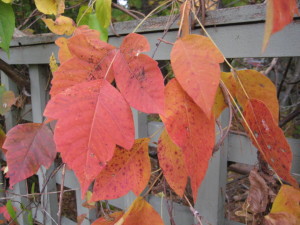
But it’s not like I’m a huge fan of being itchy. I would really rather my dog not have fleas, I prefer not to be bitten by mosquitoes, and I definitely don’t yearn to acquire head lice. So, then, why?
The answer is that kids (and not just kids) fear all these creepy-crawly itchy things. I’ve met people who are so terrified of poison ivy that they won’t even consider a forest walk. Harmless caterpillars get squished and sprayed because they might be the itch-inducing sort. I’ve seen kids, even infants, drenched in DEET and Off! to avoid the annoyance of mosquito bites.
My goal is to remind folks to reach for the fly swatter instead of going straight to the nuclear option when it comes to dealing with these irritating creatures. To consider the possibilities of brewer’s years and garlic for treating fleas before reaching for the bottle of chemicals. To consider an organic bug repellant before getting out the DEET. To learn to identify poison ivy or nettles and avoid them, instead of using a gallon of Round-Up.
We fear what we don’t understand. I’m not trying to create mosquito lovers, flea fans or bedbug admirers. I’m trying to demystify these things so that kids can understand them and learn how to cope with them.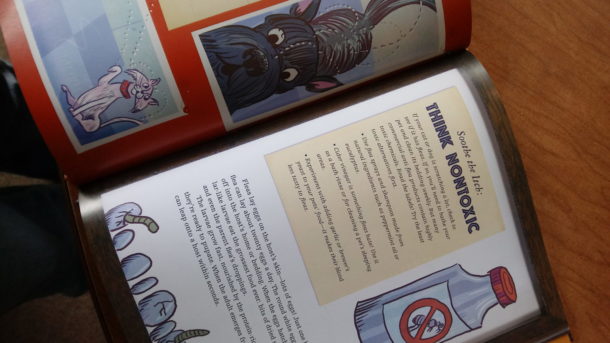
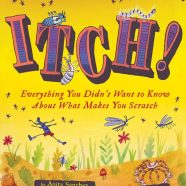

 A Junior Library Guild Selection
A Junior Library Guild Selection
 I was surprised to find that, even as he was dodging sniper bullets, one of the main problems on his mind was being itchy.
I was surprised to find that, even as he was dodging sniper bullets, one of the main problems on his mind was being itchy.





Recent Comments